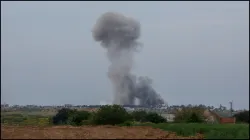Israel-Hamas war: UN Security Council to vote on US resolution on ceasefire in Gaza on Friday
The United States has traditionally shielded Israel at the UN, vetoing three resolutions in the Security Council that called for an immediate ceasefire. However, US-Israel relations have soured due to the worsening death toll and the humanitarian crisis in Gaza, along with a planned Rafah invasion.

Washington: The United States will ask the United Nations Security Council on Friday to back its resolution calling for an immediate ceasefire in the war-torn Gaza Strip and a hostage deal between Israel and Hamas, increasing pressure on the former to allow more humanitarian aid and better protect civilians. Strong differences have emerged between the US and its closest ally Israel over the devastating war that has killed over 31,000 Palestinians.
The resolution marks a further toughening of the US stance towards Israel as the latter has remained adamant about conducting a further invasion in the southern Gaza city of Rafah, bordering Egypt. The resolution marks a big change as the US had overwhelmingly backed Israel in the war against Hamas and was previously averse to the word 'ceasefire', vetoing measures that called for an immediate truce.
The draft resolution says an "immediate and sustained ceasefire" lasting roughly six weeks would protect civilians and allow for the delivery of humanitarian assistance. The text also backs negotiations brokered by the US, Egypt and Qatar over a ceasefire and emphasises support for using the period of the truce to intensify efforts in pursuit of a "lasting peace".
Nate Evans, spokesperson for the US mission to the United Nations, said on Thursday that the resolution resulted from "many rounds of consultations" with members of the 15-seat Security Council. To pass in the Security Council, a resolution needs at least nine votes in favor and no veto by the US, France, Britain, Russia or China.
US efforts to broker Israel-Hamas truce
US Secretary of State Antony Blinken said on Thursday he believed talks in Qatar, which are focused on a six-week truce and the release of 40 Israeli hostages and hundreds of jailed Palestinians, could still reach an agreement. The main sticking point has been that Hamas says it will release hostages only as part of a deal that would end the war, while Israel says it will discuss only a temporary pause.
Washington for long has called for any Security Council support for a ceasefire to be linked to the release of hostages held by Hamas in Gaza. Hamas attacked Israel on Oct. 7, killing 1,200 people and taking 253 hostages, according to Israeli tallies. Israel's offensive has killed almost 32,000 Palestinians and displaced more than 80 per cent of the population, triggering a humanitarian catastrophe.
During the war, the US has vetoed three draft resolutions, two which would have demanded an immediate ceasefire. Most recently, the US justified its veto by saying such council action could jeopardise ceasefire talks. It has traditionally shielded Israel at the UN but has also abstained twice, allowing the council to adopt resolutions on increasing aid and extended pauses in the hostilities.
Biden and Netanyahu hold talks
Earlier this week, US President Joe Biden and Israeli Prime Minister Benjamin Netanyahu held a telephonic conversation for the first time in a month amid differences over the Rafah invasion plan. Biden told the Israeli PM that he was deeply concerned about the prospect of Israel conducting major military operations in Rafah on the lines of those in Gaza City and Khan Younis, according to US National Security Adviser Jake Sullivan.
The White House has been sceptical of Netanyahu's plan of carrying out an operation in the southern city of Rafah, to which more than a 1 million displaced Palestinians have fled, as Israel looks to eliminate Hamas. Netanyahu on Wednesday said that preparations for an invasion into Rafah were underway, but launching an attack will "take some time".
Netanyahu agreed to send a team of experts to Washington to discuss the Rafah plans. Israeli Defence Minister Yoav Gallant will also visit Washington separately next week. In an earlier meeting with Blinken, Egyptian President Abdel Fattah el-Sissi stressed the need for an immediate cease-fire and warned against the “dangerous repercussions” of any Israeli offensive in Rafah, according to a statement issued by el-Sissi's spokesperson.
(with inputs from agencies)
ALSO READ | Israeli airstrikes kill 20 Palestinians in Rafah, central Gaza as Biden and Netanyahu hold talks